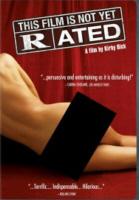 |
|

|
The Motion Picture Association of America's film rating system has been a fixture of movie-going for almost half a century at this point, yet the system by which the ratings are assigned remains far from transparent; in fact, the secrecy that surrounds the process and the people doing the rating is likely the envy of many corporations, not to mention the espionage community. It is this cloak that filmmaker Kirby Dick sought to penetrate in a documentary backed by (unsurprisingly) The Independent Film Channel, the BBC, and (somewhat surprisingly) Netflix. To this end, Dick interviews filmmakers who have run afoul of the MPAA, film critics and even a couple of former raters who are apparently courting some legal action by spilling the beans. These are interspersed with clips from the affected films, as well as news footage, quite frequently featuring the MPAA's originator and head for many years, Jack Valenti. What emerges is a picture that film buffs have been privy to, vicariously, for many years, a process which is not exactly draconian but is maddeningly inconsistent, and an appeals process in which one is not allowed to discuss previous films and how they have been rated, nor even ask the identity of the jury sitting in judgement of one's work. In violation of that, Dick often juxtaposes clips from movies with equally explicit content, the difference being one flick got the dreaded NC-17, while the other got the magic R rating. Especially compelling are segments such as South Park co-creator Matt Stone detailing the difference in dealing with the MPAA on the independent Orgazmo and the major studio-backed South Park movie. Preventing the film from becoming a talking heads festival (and adding a bit of storyline) is Dick's hiring of a private investigator to ferret out the identity of the raters; the lady does her job well, but it has to be admitted that these segments can get pretty creepy for anyone who fancies they still have - or even can have - a private life in today's world.
Largely recorded on digital video, the picture quite simply is what it is. The audio is nice and clear, with all subjects perfectly miked. The menu system is nicely uncluttered, and needless to say, one does not have to sit through several big studio previews or slick anti-piracy notices before even reaching said menu.
There is, first off, an audio commentary by Dick, producer Eddie Schmidt, private investigator Becky Altriger and film critic Drew McWeeny aka "Moriarty" of the Ain't It Cool News site. McWeeny is introduced as a sort of moderator to prod the conversation if it ever lags, but such instances are rare; Dick, in particular, is a very well-spoken fellow. This is followed by a Q&A session after a showing at the 2006 SXSW Film Festival, which duplicates some of the info conferred in the audio track. There is also a trailer. Deleted Scenes has five segments which must have been murderous to cull - they're that good. The lengthiest is Funnymen of Censorship, in which Kevin Smith and John Waters hold forth on their travails; and it could be argued that The MPAA vs. New Technologies, in which Electronic Frontier Foundation attorney Fred von Lohmann talks about the organization's lobbying efforts on behalf of copyright extension and crippling new tech with Digital Rights Management schemes deserves a feature of its own - but that is likely the nerd in me coming to the fore. Like a lot of documentaries, This Film Is Not Yet Rated won't reward multiple viewings, but also, like a lot of documentaries, it also answers a lot of questions while raising some new ones - and that's the mark of a good documentary. Dr. Freex, 4/15/2007 |
|
|
|
|

